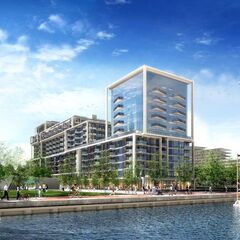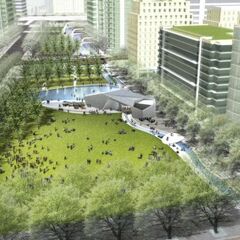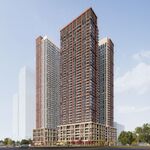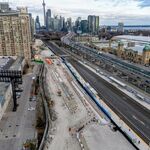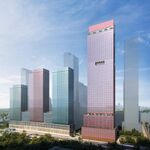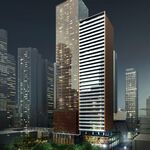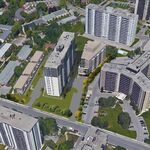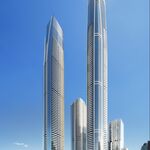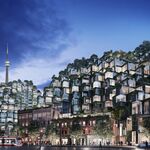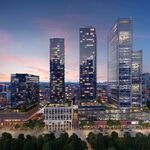Progress on Hines’ and Tridel’s 13 acre mixed use waterfront development called Bayside is ramping up as strong pre-sales encourage the developers to accelerate commencement of certain components. Encompassing over two million square feet and comprising commercial, retail, cultural and residential space including affordable housing, the project is a major part of Waterfront Toronto’s plan for revitalizing the city's waterfront between Sherbourne and Parliament Streets.
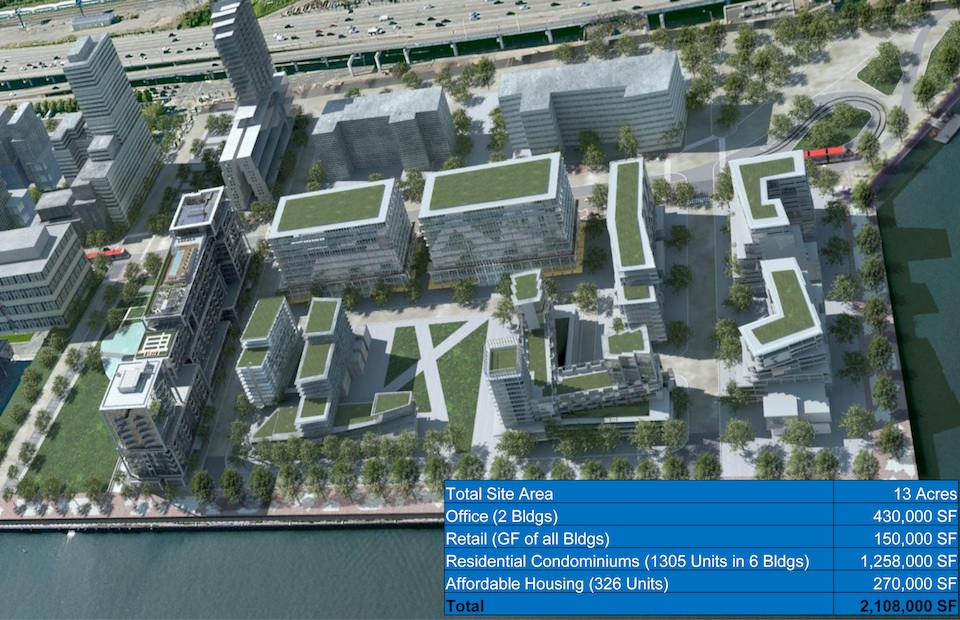 Aerial rendering of Bayside and stats, by Tridel and Hines, image courtesy of the developers
Aerial rendering of Bayside and stats, by Tridel and Hines, image courtesy of the developers
Aqualina on the western perimeter of the project will be the first condominium building to be constructed. Pre-sales were launched in July of this year with 70% of the units being sold within the first three weeks. With over 80% sold as of this writing, the developers intend to accelerate the commencement of construction from the autumn of 2014 to the spring. Exact timing is contingent on Waterfront Toronto fulfilling a number of city related obligations such as the environmental clean up, registered plan for subdivision, and the like.
 Aqualina sustainability, by Tridel and Hines, image courtesy of the developers
Aqualina sustainability, by Tridel and Hines, image courtesy of the developers
Each one of the buildings in the project has been the result of an international design competition to make them not only architecturally distinctive but also to set standards for sustainability. The developers have been working with environmental consultants throughout the design process of Aqualina and are confident at this stage that they will exceed the required LEED Gold status for sustainability. In fact, they believe that Aqualina will likely be Toronto’s first building to achieve LEED Platinum status.
 Integrated affordable housing/market condo at Bayside, image courtesy of the developers
Integrated affordable housing/market condo at Bayside, image courtesy of the developers
The integrated market condos and affordable housing units will be the second building slated for construction. Commencement was originally planned for March 2016, but due to the success of Aqualina, that date has been moved up to autumn 2015.
Hines Director Samidha Thakral points out that there were two ways that the developers could meet their obligation of providing 20% affordable housing on site. The first was for the city to simply build it themselves independently on the two blocks of the eastern flank of the property. The second option was to pursue the “affordable housing pilot project”, whereby the affordable building is physically integrated with the market condos. This second route was chosen by Hines and Tridel—an innovative experiment that has not been tried before in Toronto. She references the Shangri-La Toronto to provide some context: “It has condos and it has a hotel, both function separately: different entrances, different everything… but when you look at it from the outside it looks like one building. That’s how this is going to be.” Thakral also highlights the fact that the City is paying for the cost of construction only, not buying condos at market rate.
The other affordable building on the site will be fully affordable rental housing. Construction of that building is contingent on funding from the city.
 Timing of components at Bayside, by Tridel and Hines, image courtesy of the developers
Timing of components at Bayside, by Tridel and Hines, image courtesy of the developers
Although dates are provided on the rendering above for the two office buildings, those dates could be moved forward as well depending upon how quickly leasing progresses. With almost 5 million square feet of office space under construction in Toronto and less than about 50% of it leased, competition for tenants is stiff. Most of that available space is clustered in the south core and close to Union Station, so it has excellent connectivity to public transport and amenities. By contrast, much of the eastern portion of the waterfront still feels disconnected and "abandoned".
As Ms. Thakral points out, when looking for a new office building location, the first priority is convenience and the second is amenities. “How will you get to work and where will you go at lunch. That’s more important than are you close to the lake.” Added to that, the LRT line that Waterfront Toronto promised would service the site has been indefinitely delayed as costs have risen to over three times the amount they had projected. Thakral calls this “one of the biggest challenges to leasing the office space,” noting that transport “is going to be a key factor in the success of this whole waterfront development”. She sums it up by saying “we’re working with all of those challenges in a market that is now offering a a good amount of new office space.”
 Aqualina and office buildings at Bayside by Tridel and Hines, image courtesy of the developers
Aqualina and office buildings at Bayside by Tridel and Hines, image courtesy of the developers
There are of course some significant features of the project that are sure to draw a particular kind of tenant to the site. “It is a very unique urban-campus type of environment”, says Thakral. “And if there is a smaller tenant who wants to be a single building user, this is a unique opportunity. Instead of being one of the small tenants in a big building, they get the opportunity to be the single tenant in these building”.
Thakral sees the tech sector as being an example of the kind of industry that would find these buildings particularly suitable. As she says, those are the people who want to be downtown: “We’ve seen Google, Apple, Coke relocate from suburban locations to downtown locations because people that they hire want to live downtown; they like the amenities and they like not having to get on a train for 45 minutes… so that’s what we think our target segment is.”
 Amenities Bayside Toronto, by Tridel and Hines, image courtesy of the developers
Amenities Bayside Toronto, by Tridel and Hines, image courtesy of the developers
Amenities at Bayside will include a grocery store at the second residential building, daycare facilities and a community centre. There will be approximately 150,000 square feet of what is called “ground floor animation” retail space. This means interactive space like cafés, restaurants and art galleries as opposed to stretches of blank walls that don’t invite the public in. “It’s going to be a neighbourhood that has something to offer to everyone and that will serve the neighbouring communities as well”, says Thakral.
 Rendering of retail space at Bayside Toronto, by Tridel and Hines, image courtesy of the developers
Rendering of retail space at Bayside Toronto, by Tridel and Hines, image courtesy of the developers
Hines are presently negotiating terms with a major partner to lead the retail component of Bayside and make sure it is in keeping with the overall vision for the development. Although too early to release the name of the company they are partnering with, Thakral says it is “one of the the leading owners and operators of retail space in Toronto.”
 Rendering of Waters Edge Promenade at Bayside Toronto, by Tridel and Hines, image courtesy of the developers
Rendering of Waters Edge Promenade at Bayside Toronto, by Tridel and Hines, image courtesy of the developers
Much of the retail space of the project will face the Waters Edge Promenade. This will essentially be a continuation of what is already present at the Corus building just to the west of the Bayside property. Along with the pedestrian component, this new stretch of the promenade will feature a street open to vehicles that will allow cars to drive along the lake front, something that doesn't really exist in downtown Toronto today.
Hines have been in the business for 50 years and have done multiple mixed use communities and 128 million square feet of development across different cities around the world. Ms. Thakral says they are “very excited about this one on Bayside because of its location on the water and this amazing city, Toronto, that changes every day and is just so unique… and we want to make sure to make it a very diverse neighbourhood that is welcoming to everyone and that draws the city to the lake”.
Want to know more about Aqualina? Click on the dataBase file linked below for several more renderings and lots of info. Want to talk about the site? Choose one of the associated Forum thread links, or leave a comment in the space provided on this page.
| Related Companies: | CCxA, EQ Building Performance Inc., Hines, II BY IV DESIGN, KIRKOR Architects and Planners, Tridel |

 1.2K
1.2K 



